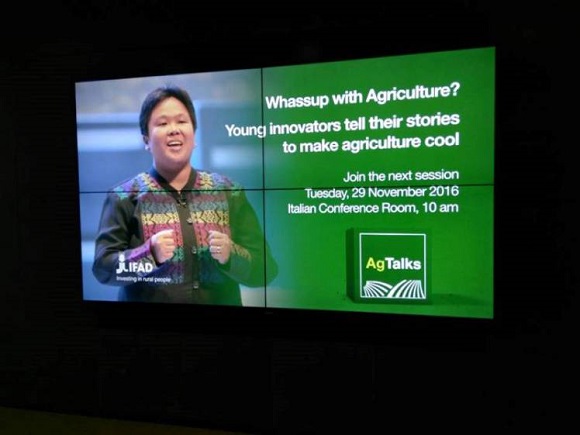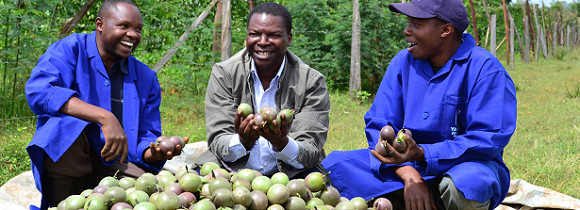A few days ago some 150 students from eight universities from around the world received Certificates of Appreciation for their
-
About
- Our Work
- Get Involved
- Stay Updated
Highlights
 When most people think of agriculture in Africa, images of poor and overworked farmers with crude tools on a rural farm readily come to mind. Many, especially young Africans, still think that agribusiness is a poor man’s occupation. Nowadays everybody wants a white-collar office job in the city. Agribusiness is hardly on anyone’s mind.
When most people think of agriculture in Africa, images of poor and overworked farmers with crude tools on a rural farm readily come to mind. Many, especially young Africans, still think that agribusiness is a poor man’s occupation. Nowadays everybody wants a white-collar office job in the city. Agribusiness is hardly on anyone’s mind.Did you know that Africa sits on an agribusiness goldmine but most people just dont’t see it? If you’re one of the blind, allow me to open your eyes with a few exciting facts you need to know about agribusines in Africa…
 Learn from Cam Pauli on how he has used social media to support his business.
Learn from Cam Pauli on how he has used social media to support his business.In August 2013, my wife and I took the first step toward escaping desk-job drudgery. At the time, she worked as a nutritionist; I managed social media for a national TV network. Neither of us had experience in agriculture, but with Brielle’s food knowledge and my green thumb, we decided to try farming vegetables on our land.
Youth in agriculture has been high on the development agenda. While many policies and programs are being implemented that should bring
 From helping farmers avoid roadblocks in Ghana to advertising discounted dinners in Singapore, these apps are doing their bit for the war on waste. Supermarket chain Asda has become the latest retailer to attempt to use technology to tackle food waste with the launch of an app that allows suppliers to buy and sell excess produce.
From helping farmers avoid roadblocks in Ghana to advertising discounted dinners in Singapore, these apps are doing their bit for the war on waste. Supermarket chain Asda has become the latest retailer to attempt to use technology to tackle food waste with the launch of an app that allows suppliers to buy and sell excess produce.Around the world, dozens of apps are diverting perfectly good food away from bins and into rumbling stomachs. From redistributing leftovers to the poor in India to luring Dutch shoppers into supermarkets to buy lingering produce, app designers are finding ways to stem the flow of food to landfill. Here are 10 of favourite apps.

Busy, busy, busy…This quarter has been huge for our young agripreneurs in the GFAR-YPARD Young Agripreneurs Project. It’s now 10 months on since they thrilled the audiences at GCARD3 with their enthusiasm, drive and energy in describing their projects. These have all started with the young agripreneurs matched with mentors, engaged in coaching and training, and utilizing their seed funding aligned with their business plans. There have been the inevitable ups and downs – all part of being a young agripreneur and it’s great to see that they are all on track and embracing the challenges and opportunities that the YAP project has offered.
Run a quick Google search on African women making it in business, and you will rarely find a young woman engaged in rural farming. But Mavis Nduchwa has challenged norms by founding and successfully managing a commercial animal feed farm in Botswana.
Thirty-three-year-old Ms. Nduchwa, who was born on a farm in rural Francistown in eastern Botswana, near the border with Zimbabwe, developed an interest in agriculture at an early age. However, as she grew older, the allure of city life drove her to earn a degree in real estate and hospitality management. She later worked as a journalist.
Abisola Adedigba, 25, recently found one of her old kindergarten books, in which readers had to match names of professions to the correct illustration. The farmer, she said, was depicted as a man with a hoe.

Busy, busy, busy…This quarter has been huge for our young agripreneurs in the GFAR-YPARD Young Agripreneurs Project. It’s now 10 months on since they thrilled the audiences at GCARD3 with their enthusiasm, drive and energy in describing their projects. These have all started with the young agripreneurs matched with mentors, engaged in coaching and training, and utilizing their seed funding aligned with their business plans. There have been the inevitable ups and downs – all part of being a young agripreneur and it’s great to see that they are all on track and embracing the challenges and opportunities that the YAP project has offered.
Page 17 of 116
Get in touch
Email: [email protected]
YPARD Global Coordination UnitHosted by AGRIDEA and the Czech University of Life Sciences Prague
Lausanne, Switzerland and Prague, Czech Republic - Our Work


